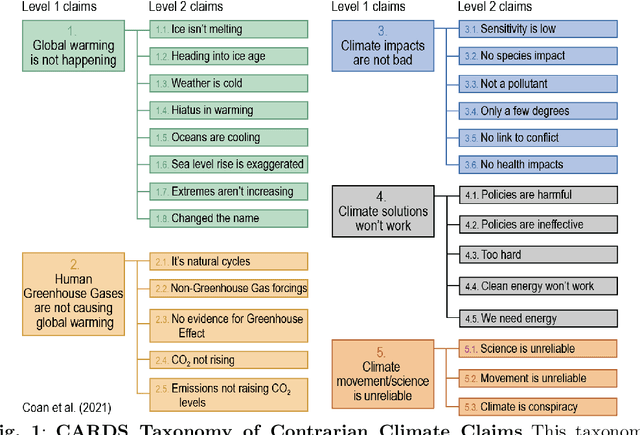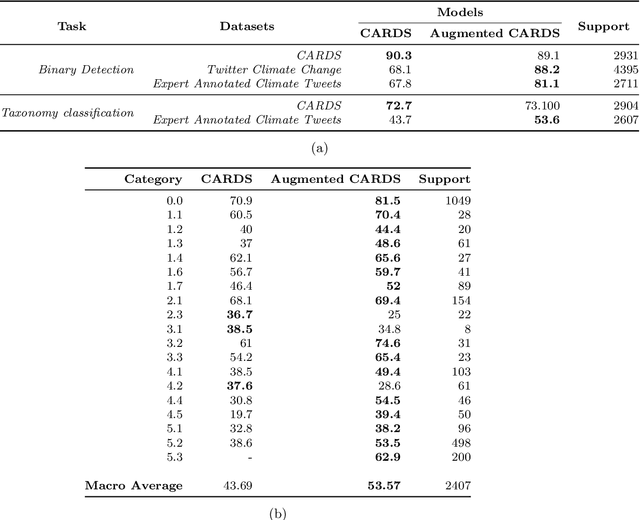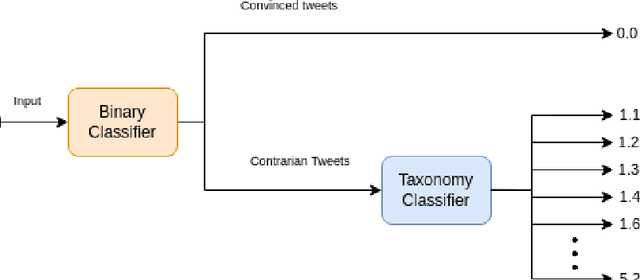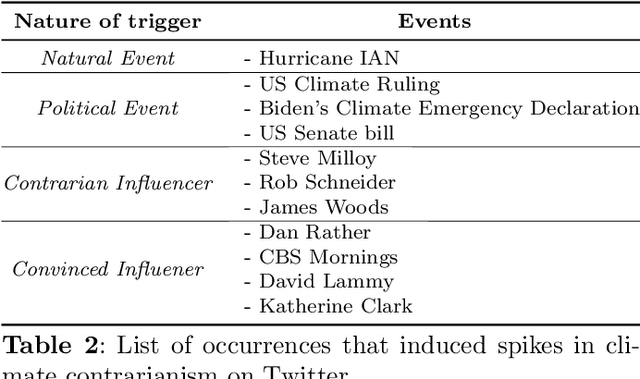John Cook
Generative Debunking of Climate Misinformation
Jul 08, 2024Abstract:Misinformation about climate change causes numerous negative impacts, necessitating corrective responses. Psychological research has offered various strategies for reducing the influence of climate misinformation, such as the fact-myth-fallacy-fact-structure. However, practically implementing corrective interventions at scale represents a challenge. Automatic detection and correction of misinformation offers a solution to the misinformation problem. This study documents the development of large language models that accept as input a climate myth and produce a debunking that adheres to the fact-myth-fallacy-fact (``truth sandwich'') structure, by incorporating contrarian claim classification and fallacy detection into an LLM prompting framework. We combine open (Mixtral, Palm2) and proprietary (GPT-4) LLMs with prompting strategies of varying complexity. Experiments reveal promising performance of GPT-4 and Mixtral if combined with structured prompts. We identify specific challenges of debunking generation and human evaluation, and map out avenues for future work. We release a dataset of high-quality truth-sandwich debunkings, source code and a demo of the debunking system.
Detecting Fallacies in Climate Misinformation: A Technocognitive Approach to Identifying Misleading Argumentation
May 14, 2024Abstract:Misinformation about climate change is a complex societal issue requiring holistic, interdisciplinary solutions at the intersection between technology and psychology. One proposed solution is a "technocognitive" approach, involving the synthesis of psychological and computer science research. Psychological research has identified that interventions in response to misinformation require both fact-based (e.g., factual explanations) and technique-based (e.g., explanations of misleading techniques) content. However, little progress has been made on documenting and detecting fallacies in climate misinformation. In this study, we apply a previously developed critical thinking methodology for deconstructing climate misinformation, in order to develop a dataset mapping different types of climate misinformation to reasoning fallacies. This dataset is used to train a model to detect fallacies in climate misinformation. Our study shows F1 scores that are 2.5 to 3.5 better than previous works. The fallacies that are easiest to detect include fake experts and anecdotal arguments, while fallacies that require background knowledge, such as oversimplification, misrepresentation, and slothful induction, are relatively more difficult to detect. This research lays the groundwork for development of solutions where automatically detected climate misinformation can be countered with generative technique-based corrections.
Augmented CARDS: A machine learning approach to identifying triggers of climate change misinformation on Twitter
Apr 24, 2024



Abstract:Misinformation about climate change poses a significant threat to societal well-being, prompting the urgent need for effective mitigation strategies. However, the rapid proliferation of online misinformation on social media platforms outpaces the ability of fact-checkers to debunk false claims. Automated detection of climate change misinformation offers a promising solution. In this study, we address this gap by developing a two-step hierarchical model, the Augmented CARDS model, specifically designed for detecting contrarian climate claims on Twitter. Furthermore, we apply the Augmented CARDS model to five million climate-themed tweets over a six-month period in 2022. We find that over half of contrarian climate claims on Twitter involve attacks on climate actors or conspiracy theories. Spikes in climate contrarianism coincide with one of four stimuli: political events, natural events, contrarian influencers, or convinced influencers. Implications for automated responses to climate misinformation are discussed.
 Add to Chrome
Add to Chrome Add to Firefox
Add to Firefox Add to Edge
Add to Edge